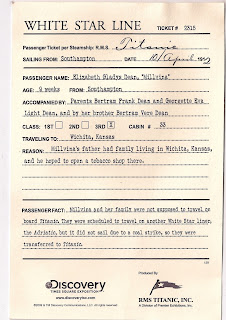This past winter, my best friend, Laura, and I traveled to New York City to visit Titanic: The Artifact Exhibition. Upon entering, we were told the exhibition should take approximately one hour to complete. We spent two hours walking through it. Unfortunately, but understandably so, no photographs were allowed inside. Readers will have to depend on my description.
The exhibition was displayed chronologically, beginning with the blueprints and construction of the ship. Large, blown-up photos of the building process were hung on the walls. Actual nuts and bolts of the ship were encased on the floor. Already Laura and I were impressed. Goosebumps ran up my arms and my heartbeat increased. I couldn't believe I was actually viewing real pieces of the real Titanic.
Once it was built, we "boarded" the ship. For me, this was the most poignant moment of the entire exhibition. There was a mini boarding platform and once we crossed it, we were in third class quarters. Soft music played in the background. The kind of music one would expect to hear on a ship in 1912. The lights were turned down so low that shadows bounced off the walls. I closed my eyes and an eerie sense of disaster loomed over me. We walked slowly down the third class corridor, remembering how most of these passengers never again saw land.
Obviously after third class is second class, and this area had a much happier feeling. Profiles of second class passengers hung on the walls. Most of these names I did not recognize, so I did not know whether they survived the sinking. Artifacts form second class rooms were displayed, as well as replica furniture and menus.
Of course, when walking through first class, I recognize all the names. Astor, Andrews, Guggenheim, Ismay, Brown, Straus...just to name a few. Artifacts from these rooms were as beautiful as I imagined. There were teacups brought up from the site that had no chips or cracks at all! One of the highlights was the built to scale Grand Staircase. If you look to the right side of my blog, you will see the one photo opportunity we were given. The farther we walked, the creaking and rocking of the ship became more apparent. Again that sense of disaster hit me.
We finally made it into a cold, dark room. The only light was surrounding an icy mass. The iceberg. This was one part of the exhibition viewers could touch. I approached it. Of course I knew this wasn't the REAL iceberg that sent hundreds to their deaths. Still, I felt angry. I touched it and the coldness made my hand feel numb. Laura did the same. We looked at each other and I knew we were thinking the same thing. If we were this cold from touching a block of ice, I can only imagine how the passenger felt plunging into the icy water. I pulled my hand away and I looked over my shoulder while walking into the next room. I could see my handprint slowly melting. Although it would eventually disappear, I knew I changed the surface of the mini-iceberg. Just like Titanic has left an impression on my heart.
The coolest part? Before entering the exhibition, everyone was given boarding passes. On it you were given an actual passenger's name, female passengers for female participants and male passengers for men, with background information of him or her. At the end, in the final room, there were lists of survivors, organized by class. My passenger? Millvina Dean who was 9 weeks old at the time of the voyage. My fun was spoiled because I knew as soon as I was given the pass that she was the last living survivor of the disaster. Laura was a first class women who survived.
Overall, if anyone has the opportunity to visit the exhibition in a city near you, go! It was reasonably priced and you can walk through at your own pace. Laura and I literally read every word of every display and no one tried rushing us through. For lovers of history, or just the movie, it was a truly moving experience!





